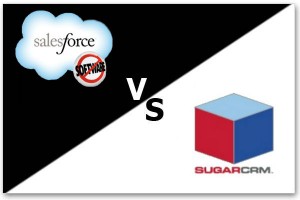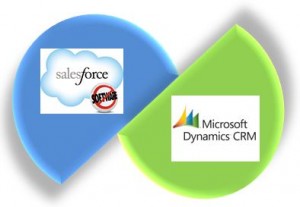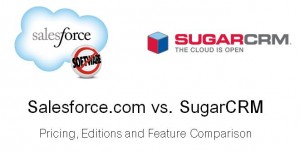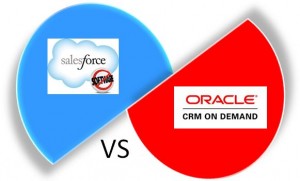
When faced with reviewing SugarCRM vs. Salesforce, it can be a daunting comparison task to determine which one is the right choice for your individual needs. The debate about which product is superior, SugarCRM or Salesforce, has been a constant one in the CRM industry.
To help you better determine which product will be the best fit with your business, we have written a brief white paper with comparison chart of the two.
Overview
The most important part of any business is the customer. How a business manages said customer can be the defining factor that makes or breaks an enterprise. Customer relationship management (CRM) software is an integral part of the success of any customer-based business. The particulars will vary from software to software, but some key elements remain the same – data management, customer tracking, workflow automation and reporting are all key functions to a top CRM.
Pricing
SugarCRM is one of the fastest growing and most cutting edge products on the market. It is available in four different editions beginning at $35 per user per month for Sage Professional and topping out at $100 per user per month for Sugar Ultimate.
Salesforce is available in five different editions and offers affordable options for any size of business. Contact Manager, the most inexpensive option, begins at $5 per user per month and the top tier option, Performance, hits at $300 per user per month.
Features
Each edition of Sugar includes on-premise or cloud deployment, scheduled data backups, social media integrations and mobile device accessibility. Many of the upper level features can be selected ala-carte as optional upgrades such as Sugar Mobile Plus along with Phone and Developer Support. The SugarCRM experience is one that is as individual as each business and offers value for the cost.
Salesforce has been a major player in the CRM industry for over 15 years. With that wealth of experience brings some exclusive features such as Sales Cloud and App Exchange as well as the Service Cloud. Salesforce does hit on the higher end of the price scale but it does have a strong reputation and continues to innovate in the industry.
To learn more, check out our in-depth white page comparison here.
Comparing Microsoft CRM and Salesforce is like comparing apples and oranges. Both cloud-based CRMs are excellent products with strong benefits, but both also have distinct differences as well. It just boils down to a matter of preference. To get a better handle on which product is the right fit for your business, we have written a brief comparison of the two.

Overview
Customer relationship management (CRM) software is a crucial part of any business plan. Regardless of the size of your business, CRM software allows you the opportunity to engage your customers and build your business. Though services can vary from software to software, there are some core elements that remain the same – data management, customer tracking, workflow automation and reporting are all key points to look for when selecting the right CRM.
Pricing
Salesforce is available in five different editions with a price range to suit the budget of nearly any business. Starting at $5 per month and reaching $300 per month at the top level, Salesforce brings 15 years of experience in the CRM industry to the table.
Compared to Salesforce, Microsoft Dynamics CRM has three pricing levels. Essential is $15 per user per month with Basic hitting at $30 per user per month and Professional clocking in at $65 month. Microsoft has been a top player in the CRM and marketing automation industry since 2003.
Features
Though Salesforce has been a decisive leader in this competition for several years, Microsoft Dynamics is rapidly making up ground.
Salesforce boasts some innovative, exclusive features. The CRM pioneer offers features such as Sales Cloud and AppExchange as well as the Service Cloud. With these exceptional features does come a higher price point than Microsoft Dynamics, but this is a product that does provide bang for your buck.
Microsoft Dynamics has the advantage of name recognition and is backed by one of the top companies in the software industry. Microsoft Dynamics also offers a more affordable base price point and can be customized to specifically suit the needs of an individual business.
To learn more, check out our in-depth white page comparison here

One of the most frequently asked questions we get from clients is ‘which is better, Salesforce or Sugar?’
In fact, we find ourselves telling clients about the differences between them so often we decided to blog about it. So this is it, our no holds barred comparison on the differences and similarities of Salesforce and SugarCRM.
Let’s start with what they have in common – more than you than you might think. Both Salesforce and SugarCRM are pioneers in the CRM movement. They both challenge the Bill Gates Microsoft archetype and ascribe to the clean aesthetic of Steve Jobs’ Apple. Both were created in California. Salesforce is based in San Francisco and SugarCRM comes from Cupertino, California in the Santa Clara Valley – also the home of Apple Inc.
Now for the differences…

Editions and Pricing
Salesforce.com comes in five different editions, ranging in price from $24 per user per year to $3,000 per user per year. While all of the editions are – in their most basic forms – the same product, there are certain features and functions that are enabled or disabled, depending on the edition purchased. Without a doubt, Salesforce.com’s most popular edition is their Enterprise Edition. With a price point of$1,500 per user per year, it is their middle of the line solution. In comparison their second most popular instance the Professional Edition, is priced at $780 per user per year.
In comparison
SugarCRM has four different editions of their commercial product: Professional, Corporate, Enterprise, and Ultimate. They have a free open-source solution titled Community.
Sugar’s cheapest instance is Sugar Professional, with a price point of $360 per user per year. From there Sugar prices rise slowly – but at their most expensive, Sugar is still only half of the most expensive instance of Salesforce.com. Sugar Corporate costs $540 per user per year while Sugar Enterprise is priced at $720 per user per year and Sugar Ultimate costs $1200 per user per year.
Sugar licensing prices are constant no matter which of the four hosting options you choose. It should be said though that some hosting options, mean additional costs.
You can download a complete guide ‘salesforce vs. sugarcrm’ by clicking on the button below.
Check out our Oracle On-demand vs. Salesforce CRM Comparison. Recently, the two companies have been going back and forth with one another about which product is better. We introduce the drama, and then encourage you to download our white paper.

What does Oracle On-demand have to say about Salesforce CRM?
Oracle On-demand announced plans to push into the $72 billion cloud-computing market in January of this year. Oracle president Mark Hurd gave more detail on the plan that Oracle first unveiled on January 15. Hurd spoke on how Oracle is trying to own a slice of the “infrastructure-as-a-service” (IaaS) market.
Cloud computing is a vast and ever growing market, involving software apps, storage, computing power, and other resources. The infrastructure part of cloud software usually involves providing the basic computing resources on which customers can run operating systems and software of their choosing.
Oracle’s proposed scheme is uniquely to the way most companies approach IaaS.
Oracle will install their high-end hardware, which they call engineered systems, loaded with Oracle software in a customer’s data center. The customer doesn’t share those systems with others—a differentiator from most cloud setups. It pays a monthly fee to rent them. This is often called a private cloud—but involving hardware, not just software. This is completely different from the current model most cloud CRM solutions provide, like Salesforce and SugarCRM.
It’s a bold new plan for Oracle and arguably a pretty smart one.
So what does Salesforce have to say vs. Oracle On-demand?
Salesforce.com CEO Marc Benioff says Oracle doesn’t ‘get’ the cloud – Hurd responded that he didn’t really care what Benioff thought. The two companies have a history of heated debates – especially amidst their vocal CEOs. However, Benioff was right in some ways. Oracle can’t offer their software in the same way Salesforce.com can.
At a time when most enterprises are starting to experiment with cloud computing, Oracle is jumping in at the right moment. Most companies are intrigued by cloud computing but don’t quite trust their most important data and databases on it.
Pricing is another huge factor for companies considering CRM. In the debate between Oracle vs Salesforce what might attract some is that they won’t have to come up with thousands of dollars up front for Oracle on Demand.
Both Oracle and Salesforce offer powerful solutions for CRM software, we often have clients asking us about their differences… so we decided to make a comparison chart.

Oracle vs Salesforce | Complete Comparison Chart






